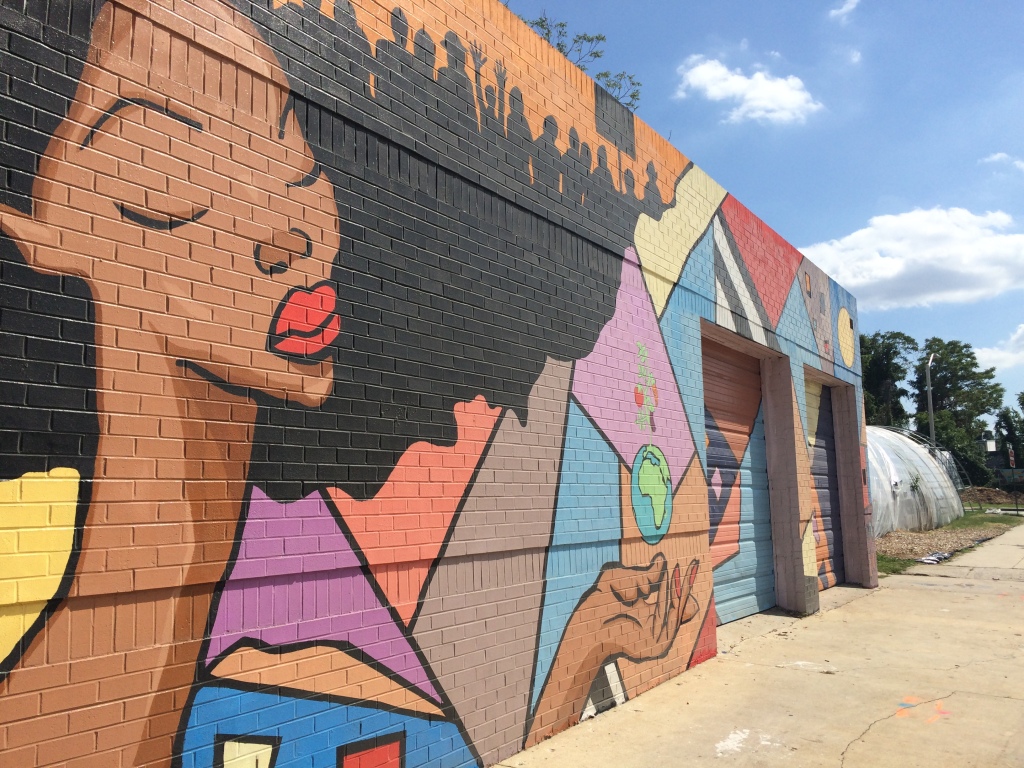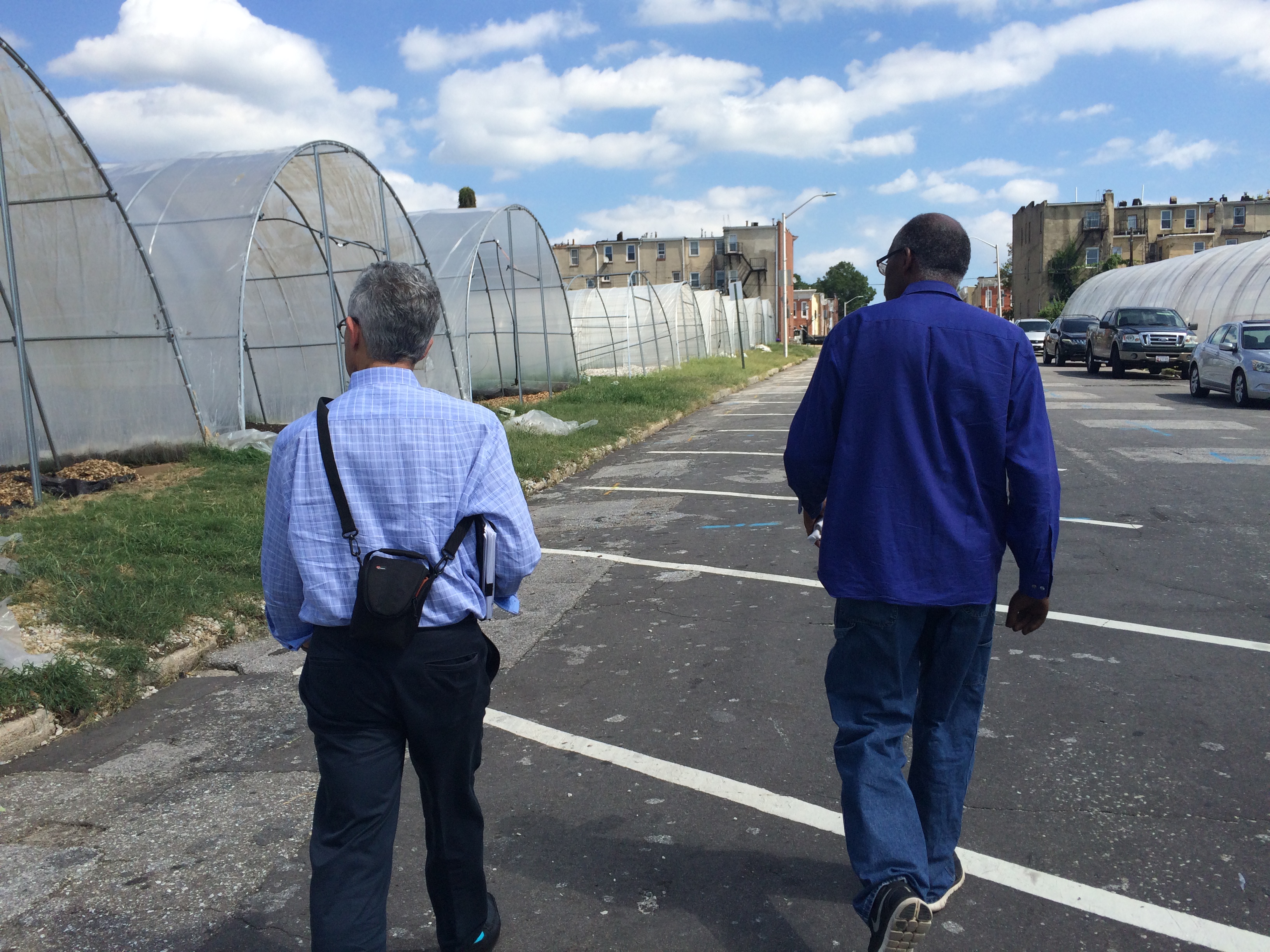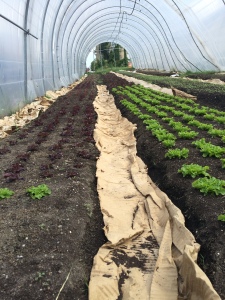Strength to Love Grows Salad Greens and Big Dreams in West Baltimore

This mural adorns the street facing side of Strength to Love II’s washing and storage facility
When you turn the corner on Kavanaugh Street, the Strength to Love II hoop houses stand out like a budding oasis tucked inside the gritty West Baltimore grid. But this urban farm, founded in 2013, is growing more than just greens for its community. Strength to Love II is committed to hiring returning citizens from incarceration and providing fresh produce for the Sandtown-Winchester neighborhood.
I had the opportunity to visit the farm with Regional District Manager Norman Zwagil this past fall. As we walked through rows of spinach and romaine, Farm manager Clayton Williams told us about their plans to grow the farm — one hoophouse at a time. He also reported that Strength to Love had just opened a weekly stand at a local corner store and they were looking into other ways to bring their produce to Sandtown residents.

Regional District Manager, Norman Zwagil, tours Strength to Love II Hoop Houses with the farm’s sales manager, Wendall Holmes
Sandtown-Winchester has the unfortunate reputation as the real world inspiration for the HBO series “The Wire.” It is also where Freddie Gray was killed in police custody and riots subsequently ensued. Sandtown has more residents in state prisons than any other Baltimore neighborhood, the homicide rate is double the rest of the city, a third of its buildings are vacant, and a quarter of its working-age citizens are unemployed.
While there is no denying Sandtown’s struggle, too many people only know the neighborhood for its blight. Up until the late 1960s, Sandtown was a thriving African-American community of artists, laborers, and professionals alike, a place where Billie Holiday and Diana Ross performed, where Supreme Court Justice Thurgood Marshall graduated from high school.
Founder of Strength to Love II, Elder C.W. Harris, has been organizing for decades to revive the Sandtown of his childhood. Strength to Love II is his newest undertaking through the nonprofit Intersection of Change, which also runs a community art space and a drug addiction and homelessness recovery program for women.
 The urban farm seeks to teach returning citizens entrepreneurial and agricultural skills while providing much needed access to affordable fresh produce in Sandtown, what some would call a food desert. Strength to Love II got its start with the help of land-leasing program through the City of Baltimore’s Food Policy initiative.
The urban farm seeks to teach returning citizens entrepreneurial and agricultural skills while providing much needed access to affordable fresh produce in Sandtown, what some would call a food desert. Strength to Love II got its start with the help of land-leasing program through the City of Baltimore’s Food Policy initiative.
At first, Strength to Love sold their greens through Big City Farms, but the aggregator has since gone out of business. However, Strength to Love is committed to pick up where Big City left off, providing urban grown salad mixes for restaurants and institutions like Bon Appétit client Goucher College. They also grow a small amount of diverse vegetables which they sell at the farmers’ market, and they have plans to expand their operation into fruit trees, flowers, and even aquaponic fish.
Mr. Williams recently participated in a national food access committee with the Union of Concerned Scientists, where he learned how other cities distributed fresh fruits and vegetables in food deserts. This experience peaked his interest in mobile markets, and he would like to start a bike-powered farm cart.
But Mr. Williams also told me that he needs more large, consistent buyers like Bon Appétit to make his mobile market dreams possible. “You all buy a lot of lettuce,” he smiled. Williams relies on consistent revenue from institutional buyers to keep the farm alive and allow Strength to Love II to offer affordable produce to local residents.
This was the first time I saw how Bon Appétit’s Farm to Fork commitment can play a role in building a more equitable food system and expanding food access. Even though Strength to Love is a nonprofit, that doesn’t mean they can overlook profitability. There is a reason why food producers have left urban areas: it is really challenging to financially sustain urban food production. By leveraging our institutional purchasing power, Bon Appétit teams can create wholesale markets for urban producers and provide some much needed stability to their business.
Going forward, I’m excited to see how Strength to Love blossoms, and full of hope that the continued support from Bon Appétit will help them fulfill their mission to bring jobs, nourishment, and healing to West Baltimore.